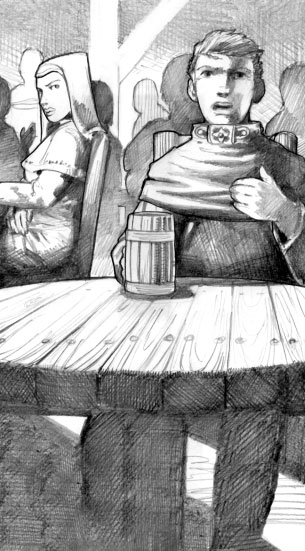
DISCUSSING
In the Shadow of the Spire – Session 26C: A Disposition of Treasure
To kill the time, Elestra grabbed some newssheets and started asking around about recent events in the city. After spending several days in Ghul’s Labyrinth, she was still feeling a little disconnected.
On the 12th, a man named Doonhin – a salt merchant in the South Market – was accused of killing his wife by throwing her off the Stormwrought Campanile. Doonhin has been pleading his innocence, claiming to have been magically charmed by a sorcerer.
On the 13th, there had been another Flayed Man killing. This one had taken place in the Guildsman’s District, suggesting that the killer might be moving out of the Warrens.
And only a few hours earlier, around noon, the Rat’s Nest – a pub on Tavern Row – had been vandalized.
In Smart Prep, I discuss the use of background events: a timeline of events that don’t directly involve or affect the PCs, but which are nevertheless a part of the world they live in. These events can manifest themselves as:
- newspaper headlines
- random rumors
- topics of casual conversation
- incidental details contextualizing revelations
And so forth.
They may have some non-direct but practical function – foreshadowing, exposition, etc. – but they’re often just about the world existing. Because in a real, living, breathing world, of course, things happen all the time that aren’t about you.
An example I like to use is a campaign set in New York city during World War II. The PCs aren’t soldiers; they aren’t going to the front lines. But the newspapers are going to be filled with D-Day and Saipan the 1944 election. That’s the type of stuff (along with local news and gossip) that will appear in your list of background events.
Like World War II, many background events will persist – evolving and developing over time. They can be a little like short stories seen at a great distance. Depending on the campaign, I’ll usually try to have a few of these “short stories” running at any given time, but I’ll also make sure to mix in a few completely random tidbits to flesh things out. In the example above, the Tavern Row vandalism is the beginning of a new event sequence, but the murder(?) at the Stormwrought Campanile is a one-off.
In a fluid campaign – particularly a sandbox – you may find that background events sometimes become foreground scenarios (and vice versa). There tend to be two common forms of this.
First, the PCs get involved. This may be the result of a player getting curious: they hear about a background event and think, “That sounds interesting,” and start nosing around. That might go nowhere or it might lead to the background event suddenly being very much an active part of the campaign.
This can also happen when the GM uses the background event as an active tool to respond to PC actions. The events are designed to be flexible tools – to be used in conversations as background details, etc.
For example, you’ve got a series of background events running about Triad attacks in Shanghai. The PCs need some hired muscle and they start asking around about who they can hire. You don’t have anything prepped for that, so you reach for the Triads that you know are part of the setting. The Triads are willing to help the PCs, but they’re going to need a favor in return. What type of favor? Well, maybe they’d like to retaliate against the rival Triad who bombed a restaurant under their protection (as previously detailed in a background event).
Now the background events aren’t in the background at all.
In the other direction, scenario hooks that the PCs choose to ignore can quite naturally transition into short background event sequences. The Flayed Man killings, above, are actually an example of this: the players in the campaign just kind of ignored the related hook and the timeline of Flayed Man killings I’d jotted down in my scenario outline simply played out.
(The scenario itself, in this case, was never fully prepped: The PCs didn’t follow that lead, so I didn’t do the prep.)
Some people get really antsy about this, declaring it “railroading” if, for example, the Flayed Man killings keep happening because the killer hasn’t been caught yet. But that’s not the case. As I’ve mentioned before, choices have meaningful consequences is the opposite of railroading (in which you choices are negated).
By the same token, it may be useful to remember that the function of background events is to demonstrate that the world doesn’t revolve around the PCs: Every job they turn down shouldn’t automatically end in utter disaster. It’s probably more likely, in fact, that the person trying to hire them finds somebody else to do the job (and do it successfully).
Letting action flow offscreen and into the background events is a great way to make the players feel as if they’re really living in the world and that their actions have meaningful and far-reaching consequences that persist even when they can’t see it. And giving players the freedom to engage with background events and make them suddenly the focus of the game is a great way to make the world feel huge and real; as if the PCs could go anywhere or open any door and find a living, breathing world waiting for them.
NEXT:
Campaign Journal: Session 26D – Running the Campaign: Counterintelligence Vectors
In the Shadow of the Spire: Index


 “Do you have a horse?”
“Do you have a horse?”











